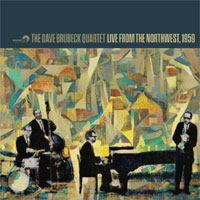Dave Brubeck Quartet • Live From the Northwest, 1959
Time Out would seem to cast a shadow on Live From the Northwest, a newly unearthed and released recording from 1959, but its music predated the Time Out sessions by four months. The album it does have a connection to is Dave Brubeck's Gone With the Wind, which was released in April 1959, the same month these recordings were made. Understandably, three numbers from that album -- "Basin Street Blues," "The Lonesome Road," and "Gone With the Wind" -- are included, along with one very familiar tune, "When the Saints Go Marching In," and a Brubeck original, "Two Part Contention." The lineup -- Brubeck on piano, Paul Desmond on alto sax, Eugene Wright on bass and Joe Morello on drums -- is the same as on Time Out and many of the albums and concerts that followed. So much of the Brubeck Quartet's voice comes from Desmond; his fluffy, laid-back tone is immediately recognizable, and it often gives the music a feeling of familiarity even when it's brand new. His interplay with the leader is sometimes astonishingly complex, as on "When the Saints Go Marching In." This is the only known recording of the classic Brubeck quartet playing this number. "Two Part Contention" appears on an earlier Brubeck album, but for solo piano. Here, at nearly twelve minutes, it is the longest track on the album, and it is a vehicle for Brubeck's intricate improvisations. With Desmond and Brubeck out front, it's easy to overlook the contributions of Joe Morello and Eugene Wright, but the Quartet's music wouldn't be the same without their rhythmic underpinnings. The three tunes from Gone With the Wind don't display the experimentation with time signatures that defines Time Out, but their invention, looseness and charm make them sound like classics the Brubeck Quartet played often. A real discovery here is the sound. There were two rather different recording venues -- the Multnomah Hotel in Oregon and the auditorium of Clark College in Vancouver, Washington -- and Wally Heider used an Ampex 350-2 two-track tape recorder and a pair of Telefunken Model U-47 microphones to capture music at both with extraordinary fidelity. Heider would become a well-known audio engineer in the San Francisco area. He founded his own studio and engineered sessions for the Beach Boys; Crosby, Stills and Nash; Jefferson Airplane; Steve Miller; Creedence Clearwater Revival; and the Grateful Dead; he also assisted in the live recording of the Monterey Pop Festival. The stereo sound here is vivid and impactful, and there is a nearly palpable sense of space. For the cuts from the Multnomah Hotel, Heider mixed in some of the venue's ambiance -- the incidental noise of the audience. If you are familiar with the Reference Recordings audiophile staple The Forward Look, Keith Johnson's recording of the Red Norvo Quintet from New Year's Eve 1957, famously done when Johnson was a student at Stanford, you have an idea of what I'm describing. The LP of Live From the Northwest was released last November for Record Store Day's Black Friday event, but there are still copies available. Also available is a CD that includes two extra cuts. The heights Dave Brubeck achieved as both a musician and
composer were probably beyond even his wildest dreams -- sold-out concerts all over the
world, consequential records released over more than sixty years -- and so much of that
success can be traced back to 1959. These sessions are an artifact of that time, of the
moment right before the Dave Brubeck Quartet became jazz's hottest ticket. |

 ineteen fifty-nine was an important year in
the history of jazz -- a true inflection point, after which the music would not be the
same. A handful of groundbreaking albums appeared, including Charles Mingus's Mingus
Ah Um, Ornette Coleman's The Shape of Jazz to Come, Miles Davis's Kind
of Blue and Dave Brubeck's Time Out. The final two have been duking it out
for the title of the best-selling jazz recording of all time. If my informal metrics --
based on which is easier to find at thrift stores and garage sales -- are any indication, Time
Out is the clear winner. What made it so consequential are the unusual time
signatures of the various numbers and their intricate structures borrowed from classical
music. These bypassed the prevailing solo-driven approach of the day, producing what was a
bona fide hit, "Take Five," along with other immediately recognizable tunes. Time
Out is the jazz album that even casual listeners have in their collections. It's
immediately likable and challenging.
ineteen fifty-nine was an important year in
the history of jazz -- a true inflection point, after which the music would not be the
same. A handful of groundbreaking albums appeared, including Charles Mingus's Mingus
Ah Um, Ornette Coleman's The Shape of Jazz to Come, Miles Davis's Kind
of Blue and Dave Brubeck's Time Out. The final two have been duking it out
for the title of the best-selling jazz recording of all time. If my informal metrics --
based on which is easier to find at thrift stores and garage sales -- are any indication, Time
Out is the clear winner. What made it so consequential are the unusual time
signatures of the various numbers and their intricate structures borrowed from classical
music. These bypassed the prevailing solo-driven approach of the day, producing what was a
bona fide hit, "Take Five," along with other immediately recognizable tunes. Time
Out is the jazz album that even casual listeners have in their collections. It's
immediately likable and challenging.